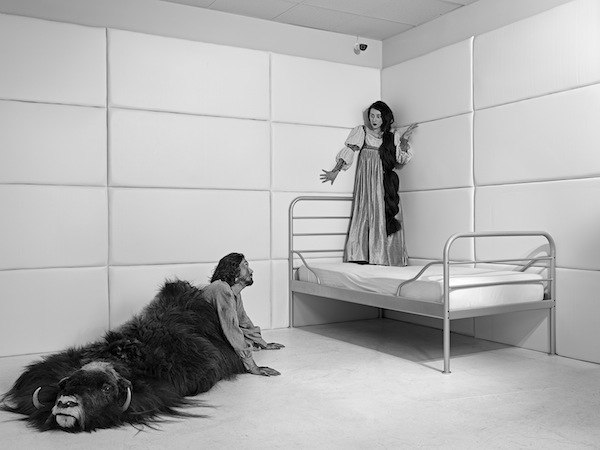Naomi Steinberg (photo by Diane Smithers)
Clearly, creativity and community involvement run in the Steinberg family. In the April 25 issue of the JI, readers heard from Myriam Steinberg, artistic director of the upcoming In the House Festival. This week, her sister Naomi Steinberg talks to the JI about her work as the executive director of the Vancouver Society of Storytelling, which is hosting its 20th Storytelling Festival June 13-15 at various venues around the city.
The Storytelling Festival presents tellers and stories from across the spectrum of custom and culture and this year’s theme, A Cabinet of Curiosities, is in keeping with the festival’s mandate of multiculturalism and education. Close to 30 storytellers will be highlighted over the course of three days. There will be First Nations stories, a Persian epic called “The Shahnameh,” family time stories and a panel discussion on storytelling for social change.
Storytelling is the oldest form of social communication, the oral tradition of passing down fables, legends, fairy tales and myths from generation to generation. It makes us aware of our history, provides an environment to share experiences and can be an effective tool for education and change. Steinberg is passionate about her craft, which she emphasized involves being able to listen, as much as being able to tell.
“A teller is a visual artist who paints with words and carves air with her/his tongue.”
“I do not want to denigrate digital storytelling, but the oral format is its own high art form. A teller is a visual artist who paints with words and carves air with her/his tongue.” As far as the local Society of Storytelling is concerned, she said, there are two aspects to storytelling, the actual telling, the entertainment piece, and then its application in the community setting to encourage social change, the educational piece. “We run the biannual festival and then in the in-between years we focus on a community project,” Steinberg explained. “We are also committed to bringing storytelling into schools.”
Last year, the society was involved with the St. George Rainway Project, a community-driven initiative to recall an historic waterway in Mount Pleasant. Last fall, 13 student stewards were selected from Mount Pleasant Elementary School to guide the community through the area and tell the story of the lost stream within the street right of way along St. George Street from Kingsway to East 13th Avenue. Part of the project was to build a storyteller’s bench at the headwaters of the creek – to leave a legacy to the neighborhood. “It was a day of community engagement and learning and showed what green redesign of a block could bring,” Steinberg said. “It encouraged dialogue and debate amongst the residents of the area. It was a great success.”
Another project was based on the five elements: air, earth, fire, metal and water. “We worked in five different communities, each focusing on exploring one of the elements through storytelling and community participation,” she explained. “We ended with a bike/bus tour to each of the five areas to view the projects. It was a unique way of highlighting the outreach possibilities of storytelling.”
Storytelling is also about preserving one’s culture. Yet different cultures can put a different spin on the same story, an example of that, Steinberg noted, is the story of the North Shore Twin Peaks – known as the Lions. “In the 1880s, British immigrants, who constituted the majority of British Columbia residents, commemorated their colonial roots by naming the two peaks after the famous crouching Lions of London’s Trafalgar Square. However, even before one British foot touched West Coast soil, the aboriginal peoples had their own mythology of the ‘Twin Sisters,’ who helped save their tribe from extinction by making peace with a warring neighbor tribe and, for this deed, were immortalized and set forever in a high place as the two peaks.”
There was very little “the Wandering Jew” could carry with him to preserve his memory as he was forced out of his home in various countries, so he took his stories, with their wisdom, humor and pathos.
Storytelling knows no ethnic or cultural boundaries; every culture has its folklore. Judaism is no exception. There was very little “the Wandering Jew” could carry with him to preserve his memory as he was forced out of his home in various countries, so he took his stories, with their wisdom, humor and pathos.
The position of a storyteller was often revered in a society. Steinberg laughed as she talked about the night she told her grandparents that she was a storyteller, in response to a query about what she was doing for a living.
“I was afraid to tell them and was very surprised when they congratulated me for being part of an honorable tradition, that of a maggid. This was an endorsement at the highest level for me.”
Steinberg has traveled around the world telling stories and presenting workshops. Of all the stories she has told, her favorite is based on an Iraqi-Kurdish Jewish fairytale called “The Wonderful Healing Leaves” from a book of Jewish folklore edited by Howard Schwartz.
After four years with the society, Steinberg said she is leaving for a year and a half abroad to gather material for her upcoming Fringe Festival production that explores the French roots of her maternal grandmother.
About why people should come to the festival, Steinberg said, “They will get a deepened appreciation of Vancouver, its landscapes, its indigenous population and its various cultural communities. They will be entertained and they will see that storytelling is fun, educational and simple, you don’t need a lot of props to participate.”
As to the future of oral storytelling, Steinberg was emphatic, “Nothing replaces heart-to-heart, face-to-face, breath-to-breath interactions. Even when you are just listening to a story, you are using more than your ears, it is an emotional experience that involves your heart and soul. The digital world is not going to take over this form of communication, ever.”
For more information and a list of the festival’s storytellers and venues, visit the website vancouverstorytelling.org.
Tova Kornfeld is a Vancouver freelance writer and lawyer.


